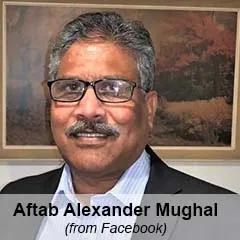
In the following article, Aftab Alexander Mughal, director of Minority Concern Pakistan, informs us of the position taken by the authoritative Council of Islamic Ideology against the violence for blasphemy that shamefully bloody Pakistan, fueling the hope that ignorance and superstition will give way to the knowledge and respect of the dictates of the Koran. FOB, rejoicing at the news, hopes that the process towards the implementation of religious freedom will accelerate more and more even in those areas of the world, apparently geographically and culturally distant, but which globalization and today's migrations make ever more present in our society.
Islamic body denounces violence over blasphemy as violent incidents are growing in Pakistan
By Aftab Alexander Mughal — On 24 February, Chairman of the Council of Islamic Ideology, the state-run body, Dr. Qibla Ayaz, publically denounced the violence against an individual over incorrect blasphemy allegations. Speaking to the press in Islamabad, he declared recent violent incidents un-Islamic.
In a latest incident on 12 February, a mentally ill person, Muhammad Mushtaq, a middle-age Muslim man, was accused of burning the pages of the Holy Quran. He was beaten to death in rural Talumba, Punjab province, by hundreds of people. Later, his tortured dead body was hanged on a tree for hours.
On 3 December 2021, Priyantha Kumara Diyawadana, 49-year-old Sri Lankan Christian, was accused of blasphemy by Muslim labourers of a local factory in Sialkot where he worked as a manager. He was lynched by a mob, who also put his dead body on fire.
The most notable incident happened in 2011, when a prominent Muslim politician, Salman Taseer, Governor of Punjab province, was murdered by his own bodyguard, Mumtaz Qadri, a religious fanatic. Taseer was shot in a broad day light because he publically, demanded for the release of Asia Bibi, a Christian mother of 4, who was in jail under alleged blasphemy accusations. Stephen Cohan, a famous American scholar, said that showed the symptoms of deep problems in Pakistan.
On 19 February, the Centre for Social Justice (CSJ) announced that from 1987 to 2021, 84 people were killed by individuals or by mobs under alleged blasphemy allegations. The Centre for Research and Security Studies’ recent report revealed that from 1947 to 2021, 89 accused were murdered extra judicially. A Catholic priest Fr. James Channan OP told UCA News on 24 February that among those 15 victims were Christian.
The CSJ, a non-governmental organisation, says that 84 people were charged under these laws in 2021. Over 80 percent of cases occurred alone in Punjab province, a conservative region where about 80 percent Christians live. The highest number of cases were recorded in three major cities; Shiekhupura, Lahore and Kasur. These cases were recorded against 45 Muslims, 25 Ahmadis, seven Hindus, and seven Christians.
In 1980s, military dictator Muhammad General Zia-ul-Haq inserted 8 sections into the Pakistan Penal Code under his Islamisation agenda. These sections are commonly known as blasphemy laws. Anyone who insults Islam, Islamic personalities, Muslim’s holy book or religious feelings of Muslims can be declared blasphemous. However, the laws are vague as there is no clear definition of an act of blasphemy. These laws carry fine, jail sentence, life imprisonment and death penalty.
Since their inception, the laws have widely been misused in the country. Religious minorities, including Shia Muslims, Ahmadis, Christians and Hindus, are continuously under threat, but many Muslims also the victims of alleged allegations of blasphemy. Many lost their lives by mob lynching. Human rights organisations continuously have been demanding for the repeal of these laws.
According to CSJ, in four years from 1987 to 1991, only 18 cases were registered. Later, the number constantly grew. In 9 years from 2001 to 2010, 708 cases were reported. In 2020, 208 cases were registered. 70 percent cases were against Shia Muslims, while only 5 percent against Sunni Muslims, who are about 70 percent of the total population in the country. Cases against Ahmadis were 20 percent and against Christians 3.5 percent.
Amnesty International says in its 2020 report, “The laws had been used to target the most marginalised people in society.” A resolution was passed by the European Parliament on 29 April 2021, which declared the blasphemy laws against the international human rights standards, and against the freedom of thoughts, conscience and religion.
If a person is accused, then there are fewer chances to get justice. In conservative society, judges, prosecutors, lawyers, and witnesses face pressure from fundamentalist groups. Therefore, civil-society organisations have been demanding that the government should ensure adequate protection to all those who are involved in the justice system. They further demanded that the government should take legislative measures for protection against the abuse of the laws, and prosecute those who make false accusations or are involved in extrajudicial killings.
Despite the international condemnation and on-going violent incidents, many political parties, including Prime Minster Imran Khan’s Pakistan Tahreek-e-Insaf (PTI), support the existed blasphemy laws, which many considered as draconian laws.
Blasphemy has become a contentious issue, which causes persistent violence, intolerance and fear in the society. Majority of allegations and cases were proven wrong later. However, there are no signs that the government will take necessary measures against the abuse of those laws.
Pakistan is an Islamic country where Muslims are in the majority with 96 percent of the total population. About 70 percent are Sunni Muslim while Shia Muslim make about 25 percent. Non-Muslim minorities consist of less than 4 percent of the population.





